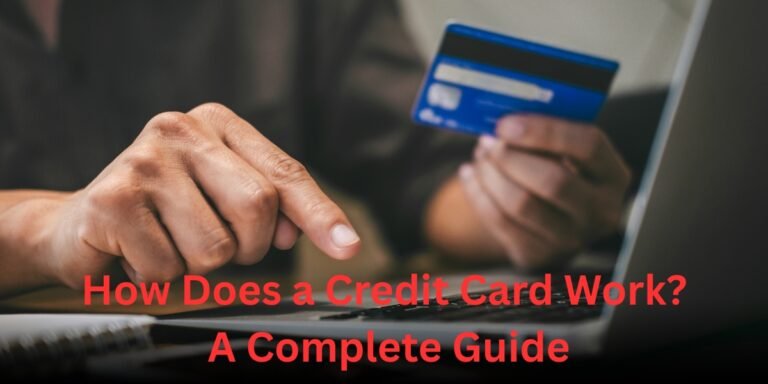Introduction
A credit card is a financial tool that allows users to borrow money up to a predetermined credit limit. It enables cashless transactions, provides rewards, and helps in building a credit score. But how exactly does a credit card work? In this blog, we will break down the working mechanism of credit cards, their benefits, and tips on using them wisely.

What is a Credit Card?
A credit card is a plastic or metal card issued by a bank or financial institution, allowing the cardholder to borrow money for purchases. Unlike a debit card, which directly deducts money from your bank account, a credit card provides a short-term loan that needs to be repaid.
How Does a Credit Card Work?
1. Credit Limit
Each credit card comes with a credit limit, which is the maximum amount you can borrow. This limit is determined based on factors like your income, credit score, and repayment history.
2. Making Purchases
When you swipe your credit card at a store or use it for online payments, the transaction is processed through the card network (Visa, Mastercard, etc.), and the amount is charged to your card balance.
3. Billing Cycle and Statement
Credit card transactions are recorded within a billing cycle (usually 30 days). At the end of the cycle, you receive a credit card statement that details all your expenses, the total amount due, and the due date.
4. Minimum Payment & Interest Charges
If you pay only the minimum amount due, the remaining balance incurs interest charges. These interest rates can be high (ranging from 12% to 36% annually), making it crucial to pay your bill in full to avoid extra costs.
5. EMI & Revolving Credit
Some banks offer EMI (Equated Monthly Installment) options for expensive purchases. Additionally, if you don’t pay your full bill, the remaining balance is carried forward as revolving credit, accumulating interest over time.
Benefits of Using a Credit Card
- Convenience: Enables cashless transactions worldwide.
- Rewards & Cashback: Earn points, cashback, and discounts on transactions.
- Credit Score Improvement: Timely payments boost your CIBIL score.
- EMI Facility: Convert large expenses into easy EMIs.
- Emergency Fund: Useful in emergencies when cash is unavailable.
Tips to Use a Credit Card Wisely
- Pay Bills on Time: Avoid late payment charges and interest.
- Keep Credit Utilization Low: Use less than 30% of your limit for a better credit score.
- Monitor Your Transactions: Regularly check statements for fraudulent activities.
- Avoid Withdrawing Cash: Cash withdrawals attract high interest and fees.
- Choose the Right Card: Select a card based on your spending habits (e.g., travel, shopping, fuel, etc.).
Conclusion
Understanding how credit cards work can help you maximize their benefits while avoiding debt traps. Always use your credit card responsibly, pay bills on time, and take advantage of rewards without overspending.



